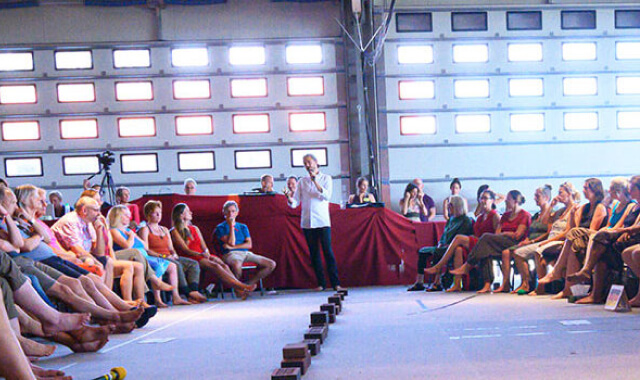The division between the former East and West Germany is still alive – despite three decades of German reunification on the formal level. There are real and measurable differences in the economic, social and political spheres. And there is a perceived division which is expressed in prejudices and attitudes towards one another, both individually and in society as a whole, in the public sphere and in the media. For example, this is expressed in calling the West Germans “Besser-Wessies” (Westerners who know everything better), and in the designation of the Eastern German states as “Dunkel-Deutschland” (the dark Germany). True coalescence has only partially taken place. This has consequences for the present.
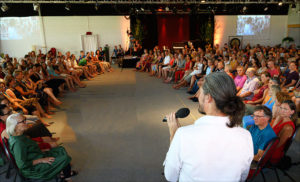 The aim of the East-West Dialogue at the Celebrate Life Festival 2019 was to achieve a greater awareness of this largely unconscious dynamic in the overall group of the festival, and to facilitate an encounter on a deeper level. To see an accurate depiction of the interior space of consciousness of society in the West and in society in the East about what really happened in the process of reunification Germany and afterwards, and what the reality of life is today. They do not coincide, they are different stories.
The aim of the East-West Dialogue at the Celebrate Life Festival 2019 was to achieve a greater awareness of this largely unconscious dynamic in the overall group of the festival, and to facilitate an encounter on a deeper level. To see an accurate depiction of the interior space of consciousness of society in the West and in society in the East about what really happened in the process of reunification Germany and afterwards, and what the reality of life is today. They do not coincide, they are different stories.
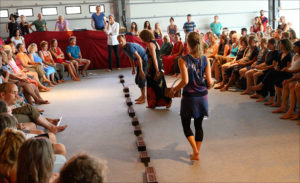 In order to let these stories enter into a dialogue, the setting of a system constellation was chosen. The large group was divided into those who came from the East and those who came from the West. Twenty people from each group, who felt the impulse to be speakers for their group, sat facing each other, with some space in between. Behind the ranks of the 20 speakers sat all the others from the respective parts of Germany. In the space between the two groups, a symbolic brick wall was laid out in the course of the session, symbolizing the division of Germany and the building of the wall.
In order to let these stories enter into a dialogue, the setting of a system constellation was chosen. The large group was divided into those who came from the East and those who came from the West. Twenty people from each group, who felt the impulse to be speakers for their group, sat facing each other, with some space in between. Behind the ranks of the 20 speakers sat all the others from the respective parts of Germany. In the space between the two groups, a symbolic brick wall was laid out in the course of the session, symbolizing the division of Germany and the building of the wall.
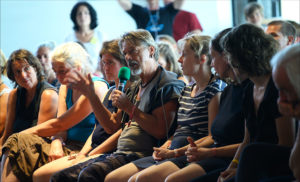 The representatives of both sides began to express in short personal statements what was going on in them and what wanted to be said.
The representatives of both sides began to express in short personal statements what was going on in them and what wanted to be said.
These were some of the points that were addressed:
- With the citizen movement in the East, many people also hoped for something completely new, for a new political system that was neither the capitalism of the FRG nor the socialism of the GDR
- There is deep disappointment there about the system of the West, which should bring freedom, but has not kept many promises
- The “reunification” took place in a way that was rather a takeover of the East by the system of the West
- A man who stood with a submachine gun at the German-German border expressed anger at the fact that we as humans are set up against each other by the systems as enemies
- In the prejudices (and also in the self-image) the people in the East are attributed a loser mentality, the people in the West a winner mentality
- Sadness was expressed over the loss of many good community achievements in the East
- The symbolic building of the Wall was experienced by some as a relief, as protection against the flooding from the West, as a shelter for the search for one’s own utopia
- The mistrust is deeply buried among the people from the East as to whether one can speak freely; the fear of the „Stasi“ (state security) and being eavesdropped on is still alive
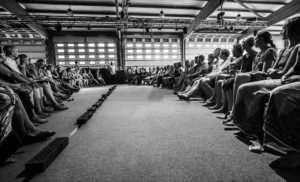 Many things were surprising for the other side. Unconscious dynamics came into focus and entered the consciousness space of the entire festival group. Traumatizations received a voice. The process began carefully and then moved spirally deeper and deeper and condensed and intensified noticeably. That was very touching, intense and hopeful. It opened the chance for a common learning process, which overcomes division and prejudices and makes healing possible. An essential dialogue had begun and was experienced as a kind of new beginning.
Many things were surprising for the other side. Unconscious dynamics came into focus and entered the consciousness space of the entire festival group. Traumatizations received a voice. The process began carefully and then moved spirally deeper and deeper and condensed and intensified noticeably. That was very touching, intense and hopeful. It opened the chance for a common learning process, which overcomes division and prejudices and makes healing possible. An essential dialogue had begun and was experienced as a kind of new beginning.
Such a dialogue is the prerequisite for genuine growing together and for the integration of all parts. Here at the festival, we did this exemplarily with several hundred people.
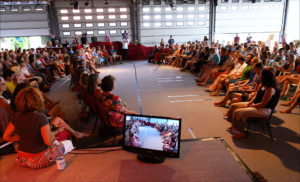 This East-West dialogue is the example of a Global Social Witnessing process. Injuries could express themselves and become conscious. The consciousness of the whole group about what happened in the process of reunification and how it still affects us today has synchronized and expanded. Through this and similar systemic dialogue processes, hostile and separated groups of people can be brought into a real encounter. The healing of conflicts and a traumatic past in a society, in cultures and between countries, can be initiated in this way.
This East-West dialogue is the example of a Global Social Witnessing process. Injuries could express themselves and become conscious. The consciousness of the whole group about what happened in the process of reunification and how it still affects us today has synchronized and expanded. Through this and similar systemic dialogue processes, hostile and separated groups of people can be brought into a real encounter. The healing of conflicts and a traumatic past in a society, in cultures and between countries, can be initiated in this way.
